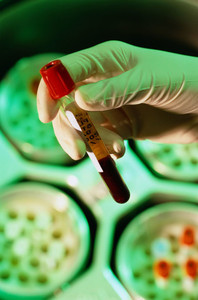The World Marrow Donor Association (WMDA) has expressed its position on the use of granulocyte colony-stimulating factor (G-CSF) biosimilars in healthy donors in an article published in the journal Haematologica [1].
G-CSF biosimilars – World Marrow Donor Association position
Biosimilars/Research
|
Posted 08/02/2013
 0
Post your comment
0
Post your comment

Human G-CSF is a single polypeptide chain protein of 174 amino acids with O-glycosylation at one threonine residue. G-CSF has the effect of increasing the production and function of neutrophils in the blood. It is a physiologically active protein that is used for the treatment of neutropenia–a low number of neutrophils–caused by cancer chemotherapy or bone marrow transplantation.
Two brand-name recombinant G-CSFs, Neupogen (filgrastim, produced in Escherichia coli) and Granocyte (lenograstim, produced in Chinese hamster ovary cells) are in clinical use. Both are licensed for mobilization of human stem cells in normal donors in the EU.
Prior to the availability of G-CSF, donors could only donate bone marrow. However, over the last 10 years there has been a marked shift from the donation of bone marrow to peripheral blood stem cells (PBSCs), due largely to donor preference. In fact in 2010, according to WMDA, 9,248 unrelated donors donated G-CSF mobilized PBSCs.
The first biosimilar G-CSF was licensed by EMA in 2008, and there are currently six biosimilar G-CSF products licensed for use in the EU [2]. All of these biosimilars are also approved for haematopoietic stem cell transplantation.
WMDA is concerned about the use of biosimilar G-CSF in healthy donors who donate PBSCs, given that this indication was obtained by extrapolation of clinical data rather than by a dedicated clinical study. WMDA believes that this ‘may raise concerns for the allogeneic transplant recipient, particularly if the mobilized product differs from that expected with the reference product’.
WMDA therefore recommends that since there has been ‘little safety analysis and no long-term follow up’ that these G-CSF biosimilars ‘not be used for mobilization in normal donors unless the donor is followed on a study looking at this question with both the recipient and the donor providing appropriate consent’.
This viewpoint has, however, been questioned by GaBI Journal author Christian Schneider [3], who reminds us that regulatory authorities approve biosimilars based on the fact that their efficacy and safety are comparable to those of the reference product. Biosimilars are also subjected to the same stringent regulations post-approval as brand-name biologicals when it comes to quality.
A recent study by German researchers has also demonstrated the ‘similarity’ of biosimilar G-CSF (Biograstim, Ratiograstim or Tevagrastim) in terms of efficacy and safety compared to reference G-CSF (Neupogen) for mobilization of stem cells in healthy donors [4].
Editor’s comment
If you are interested in contributing a research article in a similar area to GaBI Journal, please send us your submission here.
Related article
The ethics of biosimilars
References
1. Shaw BE, Confer DL, Hwang WY, Pamphilon DH, Pulsipher MA. Concerns about the use of biosimilar granulocyte colony-stimulating factors for the mobilization of stem cells in normal donors: position of the World Marrow Donor Association. Haematologica. 2011 Jul;96(7):942-7.
2. GaBI Online - Generics and Biosimilars Initiative. Biosimilars approved in Europe [www.gabionline.net]. Mol, Belgium: Pro Pharma Communications International; [cited 2013 Feb 8]. Available from: www.gabionline.net/Biosimilars/General/Biosimilars-approved-in-Europe
3. Schneider CK. The ethics of biosimilars. Generics and Biosimilars Initiative Journal (GaBI Journal). 2013;2(1).6-7. doi:10.5639/gabij.2013.0201.001
4. GaBI Online - Generics and Biosimilars Initiative. Mobilization of stem cells in healthy donors by G-CSF biosimilars shows comparable efficacy and safety to Neupogen [www.gabionline.net]. Mol, Belgium: Pro Pharma Communications International; [cited 2013 Feb 8]. Available from: www.gabionline.net/Biosimilars/Research/Mobilization-of-stem-cells-in-healthy-donors-by-G-CSF-biosimilars-shows-comparable-efficacy-and-safety-to-Neupogen
Permission granted to reproduce for personal and educational use only. All other reproduction, copy or reprinting of all or part of any ‘Content’ found on this website is strictly prohibited without the prior consent of the publisher. Contact the publisher to obtain permission before redistributing.
News
FDA approves Poherdy (first interchangeable pertuzumab) and Armlupeg (pegfilgrastim) biosimilars
EMA recommends approval for insulin glargine biosimilar Ondibta and denosumab biosimilar Osqay
General
Samsung Bioepis wins Pyzchiva case; Regeneron patent rulings threaten foreign biosimilars
Chinese biosimilars go global: growth, partnerships, and challenges
What is the future for the US biosimilar interchangeability designation

Biosimilars/Research Posted 05/06/2025
Biosimilar clinical efficacy studies: are they still necessary?

Biosimilars/Research Posted 27/05/2025
The best selling biotechnology drugs of 2008: the next biosimilars targets








Post your comment